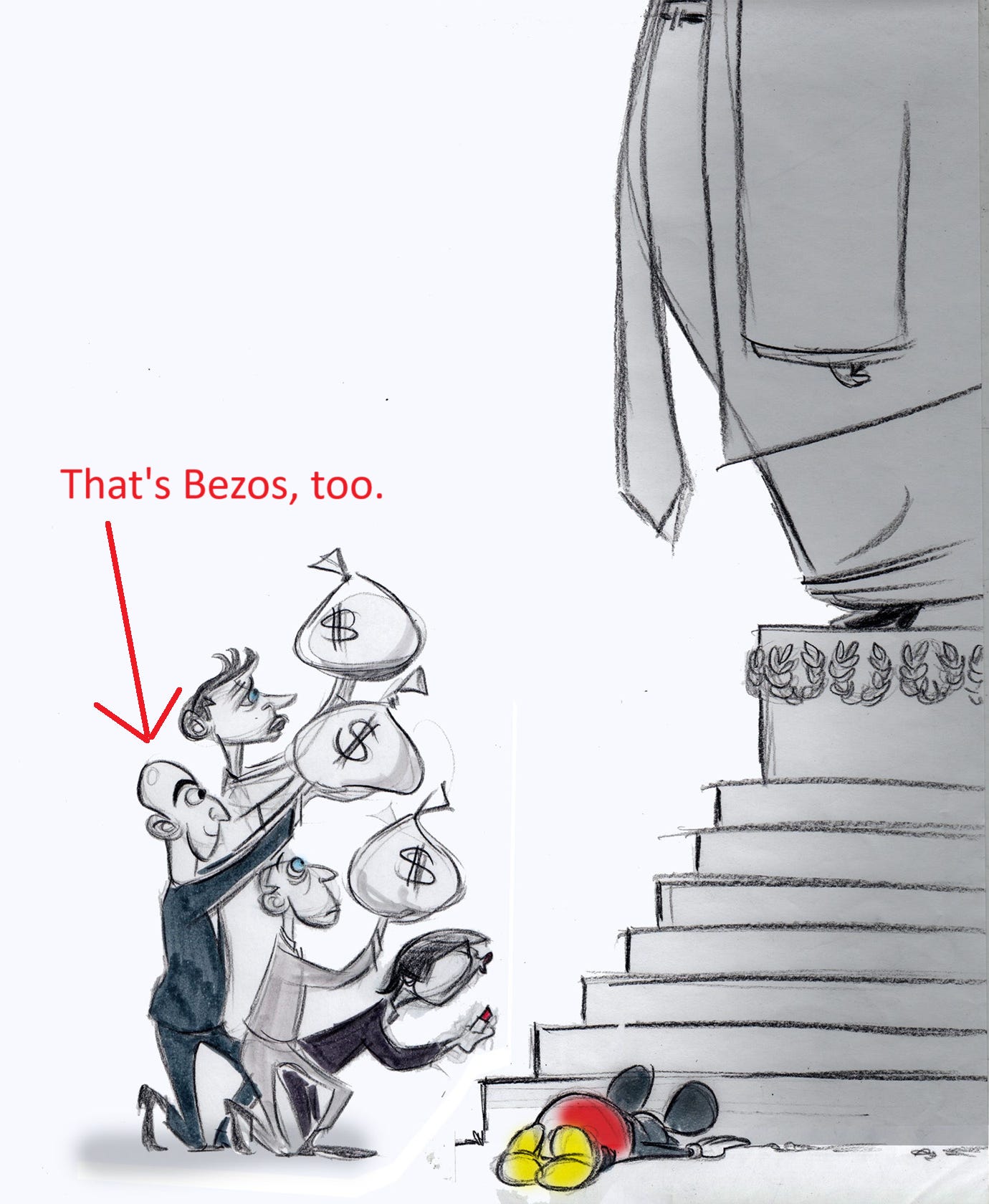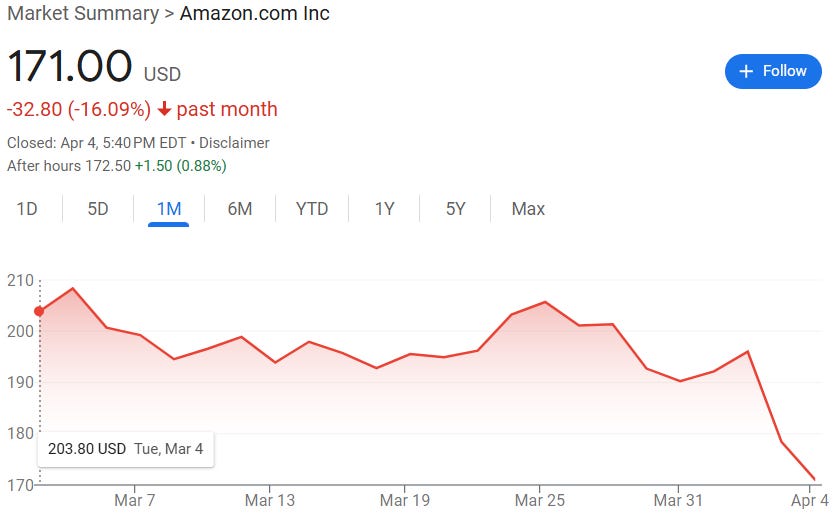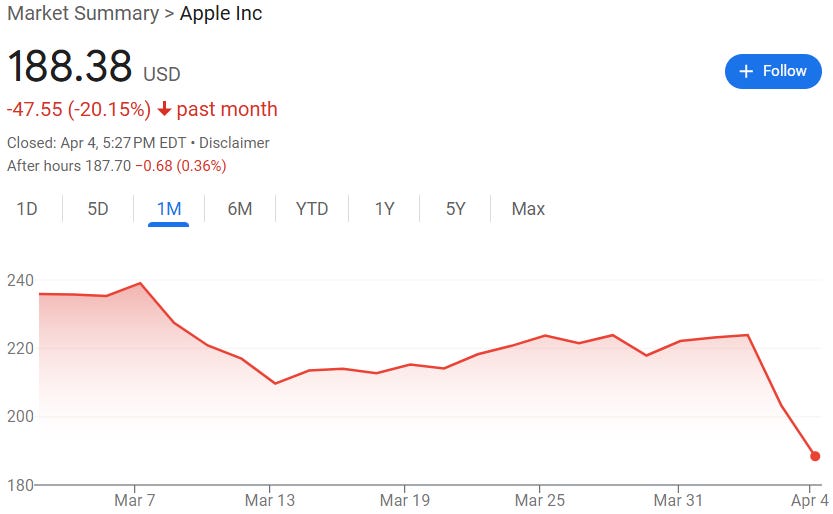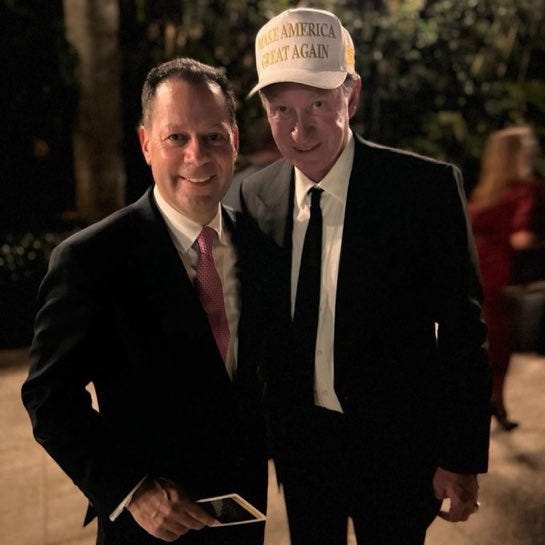After Trump's Tariff Fiasco, I Don't Want to Hear a Peep from America's Business Elites the Next Time Democrats are In Charge
PLUS: Alex Ovechkin’s Desultory Pursuit of Wayne Gretzky’s Scoring Record
For as long as I can remember, government has needed to tiptoe around corporate and business interests. Those of us who support higher corporate tax rates, unionization, raising the minimum wage, and tougher environmental regulations are invariably told by the business class and their political surrogates that such policies will upend markets, stifle growth, harm producers, punish consumers, kill jobs, and damage the economy. (That, and hurt their bottom line, but that can sound kind of greedy, so to put a little shine on that, the business class will often mention how hurting their bottom line results in all those other negative social effects; you know, what’s good for General Motors is good for America, the business of America is business, etc., etc.) Anyway, corporations have no problem spending a few million dollars in pocket change on lobbyists to regularly remind politicians of all this. And if a politician does run afoul of a corporation? Well, it’s also not hard for that corporation to divert a few million dollars more to a super PAC that can bury that politician’s constituents beneath an avalanche of attack ads informing them that this guy who’s seeking their vote is an out of touch, no good, un-American, really bad person.
A vivid example of this is from February 2009. Barack Obama had been president for less than a month and was managing the worst economic crisis to hit the United States since the Great Depression. He had just proposed the Homeowners Affordability and Stability Plan, a $75 billion program that would help nine million homeowners avoid foreclosure. The following day, during a live televised rant from the floor of the Chicago Mercantile Exchange that drew the support of the traders surrounding him, CNBC commentator Rick Santelli accused the government of “promoting bad behavior” by “subsidizing losers’ mortgages” and called for a “Chicago Tea Party” in protest.
The clip went viral, and the conservative Tea Party movement, funded in large part by the Koch Brothers, a pair of billionaire libertarian industrialists, had been born. The Tea Party would prove instrumental in the Republican take-over of the House during the 2010 midterm elections.
That’s what Obama got for meddling with the primal forces of nature. Just imagine what would happen if a president came along who didn’t merely intervene in the housing market but grabbed the entire international trade system the United States had spent the past eighty years developing and chucked it into the woodchipper. Or if he raised the actual tariff rate above the level set by the 1930 Smoot-Hawley Act, a move that (anyone, anyone?) exacerbated the Great Depression. He’d catch holy hell, right? Ned Beatty would lock him in a room and just rip him a new one.
So as the stock market plummets, the chances of a recession rise, and people around the world describe Trump’s “Liberation Day” as the end of the postwar Pax Americana, how are our corporate overlords, our Masters of the Universe, responding? How are they flexing their power to head-off what could very well be an economic catastrophe? The Wall Street Journal has it covered for us:
The global market reaction was swift, with stocks tumbling and investors retreating from the U.S. dollar. … Still, many CEOs of major publicly traded companies were silent Thursday.
That’s it? Maybe the Wall Street Journal doesn’t have as many connections to Wall Street as…no, wait, I think they do. Maybe Eleanor Hawkins over at Axios has the scoop:
American CEOs Mum on Trump’s Universal Tariffs
Corporate America’s reaction to President Trump’s tariffs has been muted so far, with many relying on trade associations or special interest groups to speak on their behalf.
Why it matters: Corporate America has recently drawn a hard line in the sand regarding how and when they comment on public policy, social issues or cultural moments.
The line is, “We only comment on policies that impact our business.” For many companies — specifically those in automotive, retail and consumer goods — this moment would qualify.
Plus, silence is a statement too. …
Driving the news: Axios reached out to more than a dozen Fortune 500 companies whose stock plummeted following the tariff news, none of which had comment.
No comment in a moment like this? Their silence is their statement? What does that mean: That they don’t like what Trump has done, so they refuse to cheerlead and praise him, or is it just acquiescence? The Washington Post has a peak behind the curtain:
A group of powerful business leaders gathered to meet with Commerce Secretary Howard Lutnick in late February, seeking reassurance that President Donald Trump could be dissuaded from following through on his promise to impose tariffs on trillions of dollars in imports.
Instead, Lutnick arrived at the former Trump hotel in Washington with a very different message.
According to four people familiar with the event, who, like others in this article, spoke on the condition of anonymity to describe private discussions, Lutnick rebuked the group, which included Amazon founder Jeff Bezos, Pfizer CEO Albert Bourla, Nasdaq CEO Adena T. Friedman and Target CEO Brian Cornell. Lutnick said the executives should wake up every morning thinking about how they can support the country, two of the people familiar with the conversation said. And he made clear that Trump would forge ahead with plans to transform the global economy.
“It was … a shot across the bow that this is the direction the president is going and to take him seriously,” one of the people said. Or, as another attendee summed it up: “Time to get on board with MAGA.”
“Get on board with MAGA”? These guys are the wealthiest, most powerful people in the world. They don’t have to get on board with anyone, especially someone with sinking approval ratings (due in no small part to his handling of the economy, I might add) hellbent on steering the economic ship into an iceberg. Remember when Obama was putting together the Affordable Care Act and the healthcare industry was like, “If you write it the way we want it written, we won’t unleash our massive public relations machine to destroy it the same way we destroyed Bill Clinton’s healthcare proposal fifteen years ago”? Yeah, that’s kind of how I figured they rolled. Apparently not.
Wait, did the Washington Post say their owner Jeff Bezos was part of that group that met with Lutnick? You mean this Jeff Bezos
the guy who joined other tech moguls like Meta/Facebook CEO Mark Zuckerberg, Alphabet/Google CEO Sundar Pichai, Tesla CEO/X overlord Elon Musk, and Apple CEO Tim Cook at Don Trump’s inauguration? Who squashed both his paper’s endorsement of Kamala Harris and this political cartoon
and reoriented the Post’s editorial content around “personal liberties and [checks notes] free markets” to ostensibly please Trump and reboot his relationship with the Once and Future King? What’s all this ass kissing buying Bezos and his fellow suzerains of Silicon Valley? I don’t think it’s power and influence. Definitely not wealth:
Bloomberg reports the world’s 500 richest people have lost nearly half a trillion dollars since Thursday. Am I to assume they’re just brushing that off like it’s no biggie? How many half-trillions do they have to spare?
Or maybe what Bezos and his buddies are buying is access? That’s what the Washington Post suggests:
Business leaders have been reluctant to publicly express concerns [about Trump’s management of the economy], say people familiar with discussions between the White House and leading companies, lest they lose their seats at the table or become a target for the president’s attacks — just as law firms, universities and others institutions have.
“What good would it do if they said anything?” said investor Mark Cuban, who supported Vice President Kamala Harris in last year’s campaign. “There is no upside.”
Cuban said Biden was “really dumb” for not meeting with CEOs, and that Trump, in contrast, has been far more strategic in his face-to-face sessions with business leaders. CEOs and top executives often complained that they lacked a direct line to Biden, and criticized his administration’s efforts to raise taxes on large companies, its support for organized labor and its increased antitrust scrutiny of mergers.
Excuse me, Mr. Cuban, but since every economic indicator is flashing red these days, there was apparently no upside to not saying anything either. That seat at the table didn’t get them anything in return but a crumbling economy, and who would have expected it to get them anything if their whole strategy was just to sit at that table in silence. It seems like these guys got played by a terrible businessman/former reality show host who they’re scared of for some reason despite their limitless reserves of wealth. Did they ever think of, like, ganging up on him? According to Fortune magazine, there are at least 500 of them. I understand they even have at least half a trillion bucks at their disposal. Or used to.
Also, if I understand this right, the business class liked Trump more than Biden because Biden wanted to raise corporate taxes, supported unions, and pursued antitrust actions. OK, I get that (even though those guys are assholes for opposing those things) but Biden was also presiding over a really good economy. Trump, on the other hand, had not only raised tariffs while he was president but was promising to do that again in a way that would be economically ruinous. You can add to that the objective fact that Trump is a notoriously loose cannon and buffoon who can’t be trusted to do the right thing. Definitely not someone anyone would want to do business with. Yet, according to the Washington Post, the business class still gravitated to Trump because they did not have a direct line to Biden, while Trump met with them in person. What, these guys were just looking for some TLC? That’s it? Maybe Neville Chamberlain had a soft spot for Hitler because der Führer was willing to meet him face-to-face in Munich. It’s still appeasement, though.
Did these guys not see this coming? Isn’t it literally their job to see this coming? Here’s an excerpt from a New York Times article by Jonathan Mahler from April 7, 2024, titled “Is Corporate America in Denial About Donald Trump?” outlining what could happen:
[F]or all Trump’s extreme rhetoric in the 2016 campaign — his threats to rip up America’s international trade agreements and his attacks on “globalization” and the “financial elite” — his presidency, like most presidencies, proved to be business-friendly. Corporate America wound up with plenty of allies in the administration, from Secretary of the Treasury Steven Mnuchin, a former Goldman Sachs executive; to Secretary of Commerce Wilbur Ross, a Harvard Business School-educated bankruptcy guru; to Trump’s son-in-law Jared Kushner, an aspiring Wall Street player. And the Trump administration’s economic agenda of reduced taxes and deregulation largely suited corporate America’s interests; JPMorgan saved billions of dollars a year thanks to Trump’s corporate tax cuts.
But Trump and those around him are signaling that a second Trump administration would be very different. They promise a more populist economic agenda and a more populist governing style to match, with steep tariffs on imported goods and punitive measures against companies that do business with China. And his team has been clear about the fact that Trump is ready to move ahead without the blessing of the business community. “You’ll see loyalists,” says Brian Ballard, a fund-raiser and former lobbyist for Trump. “Wall Street’s supermen who thought they were the smartest guys in the room? That sort of stuff he won’t tolerate.”
Scholars who have spent their careers studying populist movements are not confused about what to expect. They have seen this sequence of events play out before, to disastrous effect not just on democracies but on businesses — and business leaders. If history offers any guide, they say, it’s that the Davos crowd should be a lot more concerned about a second Trump term.
It was clear as far back as a year ago the havoc Trump intended to wreak upon this nation and the world’s economy. What were these titans of finance and industry thinking? Some insights:
“I feel liberated,” said a top banker [following Trump’s victory]. “We can say ‘retard’ and ‘pussy’ without the fear of getting cancelled…it’s a new dawn.”
I’m sure that financial institution is relieved to have that asshat keeping tabs on their bottom line. Laser focused on the things that matter. I’ve never pulled harder for a guy to go bankrupt in my life.
“Most of us don’t have to kiss [Trump’s] ass because, like Trump, we love America and capitalism.”
You sure about that? Discuss: Trump loves neither America nor capitalism.
“I am quite optimistic that this administration is going to run a very, very pro-growth agenda.”
OK, maybe if “up” means “down” and “pro-growth” means “anti-growth.” That quote, by the way, comes from David Solomon, the chief executive of Goldman Sachs. Earning every penny of that salary, I see.
“If it’s a little inflationary, but it’s good for national security — so be it. Get over it.”
That one’s from Jamie Dimon, chief executive of JP Morgan Chase. If there really are Masters of the Universe, Dimon is He-Man. His whole response to Trump’s tariff proposal—which he had repeatedly warned against during Trump’s first term—is a big ¯\_(ツ)_/¯.
Look, I’m not reflexively anti-tariff. There’s a strong case to be made for why we ought to place some tariffs on Chinese goods. There are good arguments, too, about the damage free trade can do to domestic industries, although I also think those debates inevitably come down to conservations about the sort of trade-offs we’re willing or not willing to make.
Trump’s tariffs, however, are disastrous on so many levels. They were put in place without any kind of foresight, so we as a country are now not only unprepared for their consequences but also to take advantage of them. They are so massive that the economic pain they are likely to inflict—potentially even stagflation—will be extraordinarily damaging. The gains we get from them may take years to materialize, if we even have the means to pull that off. The scheme is so one-sided the rest of the world will inevitably decide to work around the U.S. rather than with us, and even if the tariffs are repealed by Trump or a future administration, the experience may lead other countries to conclude the United States is simply too unreliable as an economic partner to do business with. Perversely, the tariffs could end up strengthening China in the long run, as China is well-positioned to take the U.S.’s place as the world’s main economic engine. To hear Trump talk about tariffs is to listen to someone who doesn’t understand how tariffs work or how complicated all this is, and who hasn’t thought more than one move ahead in the trade war he just started. And so much of this is profoundly stupid, from the ridiculous way the tariff rates were calculated to how non-retaliatory they are to the territories they have been imposed against (one of which is a pair of islands inhabited only by penguins.) At the end of the day, this is going to be a regressive tax that hits low-income earners and those dependent upon retirement and savings accounts the hardest. It’s a massive self-own, like Brexit was for the UK, only on a more catastrophic scale.
I’ll leave it to others to explain the economics of all this. (I would recommend Rogé Karma’s article in The Atlantic.) My concern here, however, is mainly political. It needs to be known and remembered that when Don Trump threatened to crash the American economy and destroy the United States’ global economic standing, and that when he actually did that, this nation’s corporate, business, and financial leaders rolled over for him. They did not put up a fight. They didn’t even protest. It’s bad enough they didn’t stand up for democracy and the stability of the American political system when it was on the line last year, but they didn’t even stand up for the American economic system and the American economic order. They didn’t even stand up for their own bottom line. Not only do they lack an understanding of the public interest, they don’t even understand their private interest. Chalk it up to stupidity. Chalk it up to cowardice. Either way, they failed this country.
These guys were never my heroes. I’m never surprised when I hear they chased profits rather than listen to their conscience. I did figure, however, that if Trump ever came for capitalism, the capitalists might punch back and soften him up for the rest of us. In true capitalist fashion, it would have been an exchange that benefitted us all. How foolish of me.
So let me just leave it at this: The next time Democrats are in charge and we propose a tax hike or a new environmental regulation or a workers’ rights bill, I don’t want to hear a word from any Wall Street suit or their political proxies about how bad it’s going to be for business. I just want them to sit there in silence, accept it, and then kiss the ring on their way out the door. Screw those guys.
Further Reading:
“Republicans Play Powerless as Trump Tariff Fears Sweep Across the Globe” (Politico)
“Trump Is Steamrolling Corporate America. Democrats Are Taking Notes” by David Atkins (Washington Monthly)
“Don’t even get me started on how disgraced must these law firms feel now, how disgraced must these companies that are sucking up to him, that are giving him tens of millions of dollars for access? Do you know what’s going to happen? Do you know how this ends? Do you know how collaborators with this country are going to feel toward collaborators with this regime? Maybe you need to go in history and see what happened in August of 1944 after Paris was liberated. They didn’t take very kindly to the collaborators. No, it was not a very pretty sight in the streets of Paris. I’m not saying that these people should be placed in pajamas and have their heads shaved, marched down Pennsylvania Avenue, and spit on. I’m not saying that. But I’m saying that that did happen. And I’m saying that these people betrayed the French nation in the same way that I think that these law firms and these giant corporate conglomerates are betraying the United States.”—James Carville, on his podcast
Signals and Noise
“Maga is Bad For Business”, “Stop Looking for Methods in the Madness”, “Trump Goes Crazy on Trade”, “Will Malignant Stupidity Kill the World Economy?” and “How a Con Man President Is Destroying Confidence” by Paul Krugman (Substack)
“Wall Street Blew It” by James Surowiecki (The Atlantic)
“The Childish Tariff Formula That Will Reshape the Global Economy” by Binyamin Appelbaum (New York Times)
“Trump Is Promising a Manufacturing Renaissance. Is That Even Possible?” by Talmon Joseph Smith (New York Times)
“Tariffs Only ‘Work’ If They Make Prices Higher” by Matthew Yglesias (Slow Boring—Substack)
“Trump Has Already Botched His Own Bad Tariff Plan” by Jonathan Chait (The Atlantic)
“Trump’s Tariffs Are Latest Sign of His Second-Term Appetite for Risk” by David E. Sanger (New York Times)
“Donald Trump’s Ego Melts the Global Economy” by Susan B. Glasser (The New Yorker)
“No Tariff Exemptions for American Farmers” by David Frum (The Atlantic)
“Want to Know How Trump Gets In? Just Look at the Coverage of Le Pen” by Ian Dunt (Striking 13—Substack)
“America’s Future is Hungary” by Anne Applebaum (The Atlantic)
“Unmarked Vans. Secret Lists. Public Denunciations. Our Police State Has Arrived.” by M. Gessen (New York Times)
“How the Trump Administration Learned to Obscure the Truth in Court” by Leah Litman (The Atlantic)
“Why Trump Says He’s ‘Not Joking’ About a Third Term” by Jonathan Chait (The Atlantic)
“The Great Grovel: How Trump Forced Elite Institutions to Bend to His Will” by Jonathan F. Harris (Politico)
“Trump Seeks Takeover of Elections in a Bid For More Presidential Power” by Dan Balz (Washington Post)
“Trump’s Science Policies Pose Long-Term Risk, Economists Warn” by Ben Casselman (New York Times)
“Trump Touted These ICE Arrests. Half Were Already In Prison.” by Maria Sacchetti and Artur Galocha (Washington Post)
“The Biggest Loser in Wisconsin” by Don Moynihan (Can We Still Govern?—Substack)
“The Gleeful Cruelty of the White House X Account” by Charlie Warzel (The Atlantic)
“Democrats Have a Problem. They Can’t Stop Talking About Their Problems.” by Mark Leibovich (The Atlantic)
From Late Night with Seth Meyer
Garbage Time: Alex Ovechkin’s Desultory Pursuit of Wayne Gretzky’s NHL Scoring Record
(Garbage Time theme song here)
On Friday night, Washington Capitals star Alex Ovechkin scored not one but two goals to pull even with Wayne Gretzky for most career goals in NHL history. With Gretzky in the house in downtown DC, Ovechkin opted to sit on #894 and forego a hat trick after the Chicago Blackhawks, trailing 4-3, pulled goalie Spencer Knight with two minutes left in the game. Ovechkin didn’t want to score the record-breaking goal on an empty net. He’ll get his next chance to surpass Gretzky today during an afternoon game against the Islanders in New York; after that, Ovechkin will have five more opportunities to break the record this season.
Ovechkin is a beloved DC sports icon. Since his rookie season with the Caps in 2005-06, the Washington sports scene has cycled through a series of local heroes: Gilbert Arenas, John Wall, Stephen Strasburg, Bryce Harper, Robert Griffin III. Each shone brightly before fading out (or, in Harper’s case, moving up I-95 for a cool $330 million.) Ovechkin, however, has been there throughout, leading consistently competitive teams onto the ice. He claimed the Conn Smythe Trophy in 2018, the year the Capitals won their only Stanley Cup and ended the DC-area’s 26-year major league championship drought. (Both the Mystics, led by Elena Delle Donne, and the Nationals, featuring stars like Max Scherzer, Trea Turner, and a 19-year-old Juan Soto, followed suit in 2019.) Along the way, Ovechkin has won three Hart Memorial Trophies (the NHL MVP award), played on thirteen All-Star teams, and landed his own brand of cereal:
But the elephant in the room is that the biggest sports star in the United States’ capital is Russian. This is his profile picture on Instagram:
Ovechkin’s relationship with Vladimir Putin is rather opaque. In 2017, Ovechkin launched a “social movement” in Russia called “Putin Team” to rally support behind the autocrat. Following the 2022 invasion of Ukraine, which began in the midst of an NHL season, Ovechkin told the media, “I’m Russian, right? It’s not something I can control. It’s not in my hands. I hope it’s going to end soon and there’s going to be peace in both countries. I don’t control this one.” He added, “Obviously, it’s a hard situation. I have lots of friends in Russia and Ukraine, and it’s hard to see the war. I hope soon it’s going to be over and there’s going to be peace in the whole world.” The NHL—which ended its business relations in Russia following the invasion—reportedly asked Ovechkin to remove the picture of him and Putin from his social media page, but he declined the request. Ovechkin has said next to nothing about the war since then, and the media does not press him for comment.
This is obviously a touchy subject. By virtue of spending so much time in the United States, Ovechkin certainly knows more about what’s really happening in Ukraine than Russian state media ever lets on. As one of Russia’s most popular athletes, he has a platform ordinary Russians lack. Yet Ovechkin’s family still resides in Russia. Who knows what kind of political stress they’re living under. And Putin does have a tendency to toss his political enemies out the windows of tall buildings. Perhaps Ovechkin’s silence is a matter of self-preservation, the most distance he can put between himself and Putin without running afoul of the regime. But as the numerous billboards around Moscow cheering Ovechkin on attest to, he also has enough stature with ordinary Russians to provide him with some measure of protection from the state. Would Putin dare harm one of Russia’s most popular athletes? Maybe he would, if Putin claimed Ovechkin’s mind had been poisoned by American media.
Many are likely inclined to turn the political blinders on and just root for an athlete on a quest to break a record. That’s what a lot of people in DC are doing. Others may find it hard to pull for a skater who can’t bring himself after three years time to change his profile pic to something less awful. So why not hope the record somehow stands and stays in the hands of a Canadian? Canada has certainly earned our sympathies these days. Its territorial integrity has been challenged by Trump, who has proposed both redrawing the border and turning Canada into the 51st state. Trump’s declaration of a pointless and costly trade war has further inflamed relations with our northern neighbor. Canadians are furious, booing “The Star-Spangled Banner” at sporting events and adopting the “elbows up” gesture as a national rallying cry. The pro-Trump candidate for prime minister has within a matter of weeks gone from a shoo-in to clearly trailing. If rooting for Ovechkin feels like backing a pro-Trump Russia, why not stand with the athlete from an anti-Trump Canada whose record the Russian is about to topple?
Yeah, about that…see, Wayne Gretzky—without question, not only the greatest Canadian hockey player of all-time, but the greatest hockey player of all-time, period—is MAGA.
Gretzky celebrated Trump’s 2024 victory at Mar-a-Lago on election night. He attended Trump’s inauguration. When Trump talked of annexing Canada, he floated Gretzky for governor. And through it all, as Canadians have spit fire south, Gretzky has stayed silent, refusing to tell Trump off, uttering not even a measured defense of his homeland. This from a man who wept when he was traded from Edmonton to ice-less Los Angeles in 1988. Who directed the team that won Canada its first gold medal in men’s hockey in fifty years at the 2002 Winter Olympics. When Gretzky took the ice as an honorary captain during a game against the United States at this year’s 4-Nations Face-Off, Canadians noticed he wore neither red nor a Team Canada jersey. They also noticed that as he watched Ovechkin tie his record in DC, he was seated next to Kash Patel, the MAGA flunky appointed by Trump to oversee the FBI.
A few weeks ago, someone smeared feces on Gretzky’s statue outside Rogers Place, Edmonton’s hockey arena. To many Canadians, their equivalent of Babe Ruth and Michael Jordan had it coming.
In what should be a joyous moment, hockey fans must instead bear witness to a Putin-allied superstar playing nine blocks from the White House break a record held by a MAGA-loving Canadian quisling. As a moment to honor a dreary present and a now-tainted legacy, it doesn’t feel worth celebrating, but we can so long as we stick to sports, slap a smile onto our faces, and sweep all its attending ickiness into one big pile that, it turns out, can’t really be covered up by a rug. Call it the least miserable option, which is about the best the powers-that-be are offering us these days. Whoop-de-doo. At least someone somewhere must be enjoying all this.
In the meantime, we can maybe hope for a better future. Could someone soon dethrone Ovechkin? Let’s check the record books. The closest active player is Czech right winger Jaromír Jágr, who is 128 goals shy. If Jágr kept pace with his career scoring average (36 goals per season) he could overtake Ovechkin in three-and-a-half seasons, but alas, Jágr is 53-years-old and an active player for Rytíři Kladno of the Czech Extraliga, where he scored five goals this past season over the course of 39 games. He’s hinted at retiring, but he’s a freak of nature, so you never know.
Sticking with active NHL players, the closest to 894 (and remember, Ovechkin will likely add to his total, so the final mark could end up significantly higher) is Nova Scotian Sidney Crosby, who has 619 goals. Crosby, a Pittsburgh Penguin and longtime divisional rival of Ovechkin, is 37-years-old, though, and would need to play for at least another 7+ seasons while maintaining his 38 goals per season average just to catch Gretzky. Long-time Tampa Bay Lightning star and current Nashville Predator Steven Stamkos of Ontario is next on the list. He’s 35-years-old and averages 41 goals per season, giving him an advantage in age and volume, but he’d need to maintain that pace until he was 42-years-old just to move into second place behind Ovechkin.
The best hope is Connor McDavid, who, like Gretzky, was born in Ontario and became a superstar while playing for the Edmonton Oilers. McDavid (or “McJesus” as he is sometimes called) has won the Hart Memorial three times and is 28-years-old. The problem is he’s not scoring at a record-setting rate: After ten years in the NHL, he *only* has 361 goals while averaging 41 goals per season. At that clip, if McDavid plays for ten more years, he’d end his career well-short of Ovechkin and Gretzky with 771 goals. What McDavid has going for him is that he’s still in his prime; if he put up four or five more seasons like his 2022-23 campaign, when he scored 64 goals over 82 games, he’d be within shouting distance of 890. But let’s get real: Gretzky scored more than 60 goals in a season five times (all before the age of 27) while Ovechkin has only done it once. Asking that of McDavid is a tall order.
As for McDavid’s politics? I’ve no clue.
















